| |
| |
Photographer,
Location |
Images |
Comments |
|
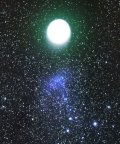
|
Thorsten Boeckel,
Fuerstenfeldbruck, Bavaria
Nov. 9, 2007 |
#1,
#2, more |
This night a discontinuing tail was clear to fotograph. For this this shot (00:10 UTC) I had to rise up to 1700m in the italian alps near Vipento to get clear sky. The comet brightness is now estimated by 2,8. The diameter is around 21,5 arcmin. The difuse disk is nice to see with the naked eyes. What a uniqe sight!
|
|
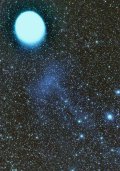
|
Peter Vasey,
Hexham, Northumberland, UK
Nov. 8, 2007 |
#1,
#2,
more |
I took these images between 2100 and 2200 UST on 8th. November. Canon 350D DSLR camera on William Optics ZS66 refractor with Celestron 0.63 reducer. The most noticeable thing was the apparent disconnection of the tail, clearly seen in the more heavily processed image, made up of 10 x 3 minute frames. The other, more aesthetically pleasing, image is a composite of 10 x 1 minute frames. Even there the detached ion tail is visible, and in this case also some structure within the coma, and of course several stars shining through the huge but tenuous cloud of gas and dust.
|
|
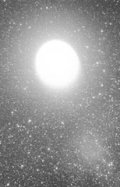
|
Dave Dockery,
Near Upham, New Mexico
Nov. 8, 2007 |
#1,
more |
Another shot of the detached tail. 20x5min exposures @ ISO 800, modified Canon 350XT and TeleVue 85mm refractor. Captured between 8:36 and 10:17pm MST.
|
|
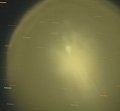
|
Chris Schur,
Payson, Az
Nov. 8, 2007 |
#1,
#2, more |
This is another very deep shot of the comets coma with the 12.5" at our high altitude Payson observatory. The Comet is extremely yellow and contains not only some extrordinary ray details, but several bow shock like envelopes around the heads leading edges.
ST10xme, 2hours
|
|
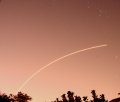
|
Ronald
Netzley,
Palm Bay Florida - approx 50 miles south of Cape Canaveral
the launch site.
Nov. 11, 2007 |
#1 |
Beautiful
clear night in the lo 60's. The USAF's Delta 4 Heavy Lifter
took off with a Military satellite to moniter exhasut gasses
from rocket take off's around the world. At approx. 2 minutes
after liftoff the delta 4 Heavy flew under Comet Holmes
from my vantage point. |
|
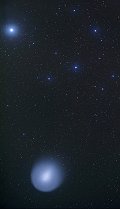
|
P-M Hedén,
Vallentuna, Sweden
Nov. 10, 2007 |
#1,
more |
A nice pair in the sky, comet Holmes together with the bright star Mirphak in the constellation of Perseus.
Captured with a Orion 80ED @ 420mm f/6, Canon Digital Rebel XT @ iso 400, 800 & 1600. 55min man. guided exposure.
|
|
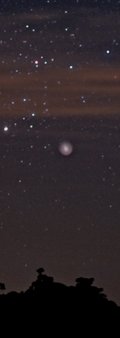
|
Andrew Catsaitis,
Central Coast, NSW, Australia
Nov. 11, 2007 |
#1 |
Being so low to the horizon here in the southern hemisphere makes it a bit of a challenge to image this wonderful comet.
Here's a widefield shot showing how low it is for us.
20Da, 85mm, ISO 800, 20 sec exp.
|
|
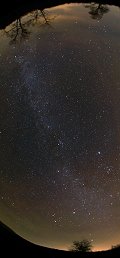
|
Tunç Tezel,
near Bolu, Turkey
Nov. 9, 2007 |
#1 |
After a long spell of overcast and rainy weather, it was clear for a night here in Bolu, Turkey. So I was able to tahe this fisheye shot of comet Holmes owning the sky. The comet, still at magnitude +2.9 (to me) was very close to zenith around 23:00 local time (GMT+2). Also visible are the Milky Way, bright winter stars and Mars rising, galaxies M31 and M33, open clusters, M34, NGC869-84, NGC752 and Alpha Persei cluster (with the comet). And as a bonus, faint ellipse of gegenschein is somewhere between Aries and M45, luckily in a clearer part of the sky. The reddish glow in the sky was caused by very thin clouds reflecting the lights of Bolu (to the east) and Düzce (to the west). This is the third time I have seen a bright comet very close to zenith (others were Hyakutake in 1996 and Machholz in 2005) and this one is also only days away from opposition, as the distance between the comet and gegenschein tells.
|
|
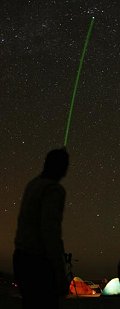
|
Amir Hossein Abolfath,
Maranjab, Isfahan, Iran
Nov. 9, 2007 |
#1,
#2,
|
Holmes is still shining in sky and still is bright enough to observe in cities. But if use a camera and a telescope you will find that it seems that tail is dis parting.
Canon EOS 5D, 15mm Fisheye and 200m L lens
|
|
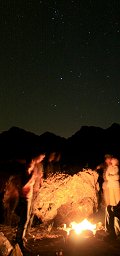
|
Atanas Gavrailov,
Hatta Village, United Arab Emirates
Nov. 9, 2007 |
#1 |
This was our weekend photo safari in Hijar Mountains on the border between Oman and United Arab Emirates. Comet 17P/Holmes suprised most of the photographers at the BBQ.
Canon EOS 30 D, Sigma Lens @ 10mm, Manual Focus, F4, ISO 640, Shutter Speed 30 seconds
|
more
images (Nov. 10): from
Mike Borman of Evansville, Indiana; from
Doug Zubenel of De Soto, Kansas;
more
images (Nov. 8-9): from
Eric Walker of Conon Bridge, Highlands Scotland; from
Jari Kankaanpaa of Kauhava, Finland, Europe; from
Mohammad Akoochekian of Kowsar Observatory, Isfahan, Iran;
from
Joseph Caruana of Ghajnsielem, Gozo, Malta; from
Fredrik Broms of Ljungsbro, Sweden; from
Ralph Ford of Redondo Beach, CA;
more
images (Nov. 6-7): from
Peter Delincak of Cadca, Slovakia, Europe; from
Khosro JafariZadeh of Ahvaz, Iran; from
Andrey Litvinov of Moscow, Russia;
more
images (Nov. 4-5): from
Deepak Dembla of the Royal Greenwich Observatory in London;
from
Dominic Cantin of Québec city , Canada;
|
|